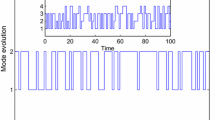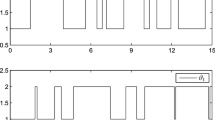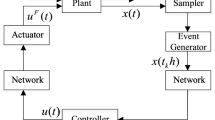Abstract
In the present study, the finite-time asynchronous dissipative filter design problem for the Markov jump systems with conic-type nonlinearity is studied. The hidden Markov model can describe the asynchronism embodied in the system modes and the filter modes reasonably. Moreover, a suitable Lyapunov-Krasovskii function is utilized and linear matrix inequalities are applied to obtain adequate conditions. These techniques guarantee the finite-time boundedness and strict dissipativity of the filtering error dynamic system. Furthermore, the design problems of the passive filter and the H∞ filter are studied by adjusting the three parameters \({\cal U}\), \({\cal G}\) and \({\cal V}\). Finally, the filter gains and the optimal index α* are obtained and the correctness and feasibility of the designed approach are verified by a simulation example.
Similar content being viewed by others

References
Shen Y, Wu Z G, Shi P, et al. H∞ control of Markov jump time-delay systems under asynchronous controller and quantizer. Automatica, 2019, 99: 352–360
Wang J, Ma S P, Zhang C G, et al. H∞ state estimation via asynchronous filtering for descriptor Markov jump systems with packet losses. Signal Process, 2019, 154: 159–167
Zhang L X, Cai B, Shi Y. Stabilization of hidden semi-Markov jump systems: emission probability approach. Automatica, 2019, 101: 87–95
Lian J, Li S Y, Liu, J. T-S fuzzy control of positive Markov jump nonlinear systems. IEEE Trans Fuzzy Syst, 2018, 26: 2374–2383
Kavikumar R, Sakthivel R, Kwon O M, et al. Reliable non-fragile memory state feedback controller design for fuzzy Markov jump systems. Nonlin Anal-Hybrid Syst, 2020, 35: 100828
Wang L Q, Fang M, Wu Z-G. Mean square stability for Markov jump Boolean networks. Sci China Inf Sci, 2020, 63: 112205
Li H Y, Shi P, Yao D I. Adaptive sliding-mode control of Markov jump nonlinear systems with actuator faults. IEEE Trans Automat Contr, 2017, 62: 1933–1939
Shen H, Wu Z G, Park J H. Reliable mixed passive and filtering for semi-Markov jump systems with randomly occurring uncertainties and sensor failures. Int J Robust Nonlin Control, 2015, 25: 3231–3251
Feng Z G, Shi P. Two equivalent sets: application to singular systems. Automatica, 2017, 77: 198–205
Shen Y, Wu Z G, Shi P, et al. Model reduction of Markovian jump systems with uncertain probabilities. IEEE Trans Automat Contr, 2020, 65: 382–388
Feng Z G, Shi P. Sliding mode control of singular stochastic Markov jump systems. IEEE Trans Automat Contr, 2017, 62: 4266–4273
Swierniak A, Simek K, Boukas E K. Intelligent robust control of fault tolerant linear systems. IFAC Proc Vol, 1997, 30: 245–248
Bäuerle N, Rieder U. Markov Decision Processes With Applications to Finance. Berlin: Springer, 2011
Zhang H, Gray W S, Gonzalez O R. Performance analysis of digital flight control systems with rollback error recovery subject to simulated neutron-induced upsets. IEEE Trans Contr Syst Technol, 2008, 16: 46–59
Shen Y, Wu Z G, Shi P, et al. Dissipativity based fault detection for 2D Markov jump systems with asynchronous modes. Automatica, 2019, 106: 8–17
Fang M, Shi P, Dong S L. Sliding mode control for Markov jump systems with delays via asynchronous approach. IEEE Trans Syst Man Cyber Syst, 2019. doi: https://doi.org/10.1109/TSMC.2019.2917926
Song J, Niu Y G, Zou Y Y. Asynchronous output feedback control of time-varying Markovian jump systems within a finite-time interval. J Franklin Institute, 2017, 354: 6747–6765
Wu Z G, Shi P, Shu Z, et al. Passivity-based asynchronous control for Markov jump systems. IEEE Trans Automat Contr, 2017, 62: 2020–2025
Zhang M, Shi P, Liu Z T, et al. Fuzzy model-based asynchronous H∞ filter design of discrete-time Markov jump systems. J Franklin Institute, 2017, 354: 8444–8460
Nie R, He S P, Luan X L. Finite-time stabilisation for a class of time-delayed Markovian jumping systems with conic non-linearities. IET Control Theory Appl, 2018, 13: 1278–1283
Song J, Niu Y G, Zou Y Y. Finite-time sliding mode control synthesis under explicit output constraint. Automatica, 2016, 65: 111–114
Cheng P, He S P. Observer-based finite-time asynchronous control for a class of hidden Markov jumping systems with conic-type non-linearities. IET Control Theory Appl, 2019, 14: 244–252
Feng F, Yaz E E, Schneider S C, et al. Discrete-time resilient controller design with general criteria for a class of uncertain nonlinear systems. In: Proceedings of American Control Conference, 2014. 4268–4273
Jeong C S, Feng F, Yaz E E, et al. Robust and resilient optimal controller design for a class of nonlinear system with general criteria. In: Proceedings of American Control Conference, 2010. 6363–6368
Jafari A A, Alimohammady M. Conic type Caffarelli-Kohn-Nirenberg inequality on manifold with conical singularity. J Pseudo-Differ Oper Appl, 2019, 10: 915–927
Kalman R E. A new approach to linear filtering and prediction problems. J Basic Eng, 1960, 82: 35–45
He S P. Energy-to-peak filtering for T-S fuzzy systems with Markovian jumping: the finite-time case. Neurocomputing, 2015, 168: 348–355
Yin Y Y, Shi P, Liu F, et al. Fuzzy model-based robust H∞ filtering for a class of nonlinear nonhomogeneous Markov jump systems. Signal Process, 2013, 93: 2381–2391
Hua M G, Zheng D D, Deng F Q. H∞ filtering for nonhomogeneous Markovian jump repeated scalar nonlinear systems with multiplicative noises and partially mode-dependent characterization. IEEE Trans Syst Man Cyber Syst, 2019. doi: https://doi.org/10.1109/TSMC.2019.2919146
Wu Z G, Shi P, Su H Y, et al. Asynchronous L2-L∞ filtering for discrete-time stochastic Markov jump systems with randomly occurred sensor nonlinearities. Automatica, 2014, 50: 180–186
Zhang L X, Zhu Y Z, Shi P, et al. Resilient asynchronous H∞ filtering for Markov jump neural networks with unideal measurements and multiplicative noises. IEEE Trans Cybern, 2015, 45: 2840–2852
Willems J C. Dissipative dynamical systems part I: general theory. Archive Rational Mech Anal, 1972, 45: 321–351
Hill D, Moylan P. The stability of nonlinear dissipative systems. IEEE Trans Automat Contr, 1976, 21: 708–711
Wu Z G, Dong S L, Su H Y, et al. Asynchronous dissipative control for fuzzy Markov jump systems. IEEE Trans Cybern, 2018, 48: 2426–2436
Dong S L, Chen C, Fang M, et al. Dissipativity-based asynchronous fuzzy sliding mode control for T-S fuzzy hidden Markov jump systems. IEEE Trans Cybern, 2020, 50: 4020–4030
Liu Y J, Fang F, Park J H, et al. Asynchronous output feedback dissipative control of Markovian jump systems with input time delay and quantized measurements. Nonlin Anal-Hybrid Syst, 2019, 31: 109–122
Feng Z G, Lam J. Robust reliable dissipative filtering for discrete delay singular systems. Signal Process, 2012, 92: 3010–3025
Dai M C, Xia J W, Park J H, et al. Asynchronous dissipative filtering for Markov jump discrete-time systems subject to randomly occurring distributed delays. J Franklin Institute, 2019, 356: 2395–2420
Dong S L, Wu Z G, Pan Y J, et al. Hidden-Markov-model-based asynchronous filter design of nonlinear Markov jump systems in continuous-time domain. IEEE Trans Cybern, 2018, 48: 2294–2304
Kim S H. Asynchronous dissipative filter design of nonhomogeneous Markovian jump fuzzy systems via relaxation of triple-parameterized matrix inequalities. Inf Sci, 2019, 478: 564–579
Wang J, Shen L, Xia J W, et al. Asynchronous dissipative filtering for nonlinear jumping systems subject to fading channels. J Franklin Institute, 2020, 357: 589–605
Yu H, Hao F. The existence of zeno behavior and its application to finite-time event-triggered control. Sci China Inf Sci, 2020, 63: 139201
Zhu Y C, Song X N, Wang M, et al. Finite-time asynchronous filtering design of Markovian jump systems with randomly occurred quantization. Int J Control Autom Syst, 2020, 18: 450–461
Fang M, Dong S L, Wu Z G. Asynchronous H∞ filtering of continuous-time Markov jump systems. Int J Robust Nonlin Control, 2020, 30: 685–698
Xu Y H, Wang Y Q, Zhuang G M, et al. An event-triggered asynchronous H∞ filtering for singular Markov jump systems with redundant channels. J Franklin Institute, 2019, 356: 10076–10101
Shang H, Zong G D, Qi W H. Finite-time asynchronous H∞ filtering for positive Markov jump systems. J Franklin Institute, 2020, 357: 11584–11603
Acknowledgements
This work was supported in part by National Natural Science Foundation of China (Grant Nos. 61673001, 61722306), State Key Program of National Natural Science Foundation of China (Grant No. 61833007), Foundation for Distinguished Young Scholars of Anhui Province (Grant No. 1608085J05), Key Support Program of University Outstanding Youth Talent of Anhui Province (Grant No. gxydZD2017001), and Serbian Ministry of Education, Science and Technological Development (Grant No. 451-03-68/2020-14/200108).
Author information
Authors and Affiliations
Corresponding author
Rights and permissions
About this article
Cite this article
Zhang, X., He, S., Stojanovic, V. et al. Finite-time asynchronous dissipative filtering of conic-type nonlinear Markov jump systems. Sci. China Inf. Sci. 64, 152206 (2021). https://doi.org/10.1007/s11432-020-2913-x
Received:
Revised:
Accepted:
Published:
DOI: https://doi.org/10.1007/s11432-020-2913-x



